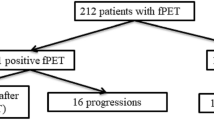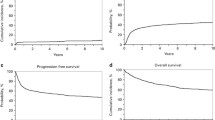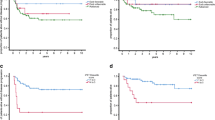Abstract
Introduction
Patients with relapsed/refractory Hodgkin lymphoma (R/R HL) experience high response rates upon anti-PD1 therapy. In these patients, the optimal duration of treatment and the risk of relapse after anti-PD1 discontinuation are unknown.
Methods
We retrospectively analyzed patients with R/R HL who responded to anti-PD1 monotherapy and discontinued the treatment either because of unacceptable toxicity or prolonged remission. A machine learning algorithm based on 17 candidate variables was trained and validated to predict progression-free survival (PFS) landmarked at the time of discontinuation of anti-PD1 therapy.
Results
Forty patients from 14 centers were randomly assigned to training (n = 25) and validation (n = 15) sets. At the time of anti-PD1 discontinuation, patients had received treatment for a median duration of 11.2 (range, 0—time to best response was not statistically significant in discriminating patients with PFS lesser or greater than 12 months). Considering PFS status as a binary variable (alive or dead) at a specific time point (12 months) is convenient, intuitive and allows for comparing the value of potential predicting variables in these two groups of patients. Nonetheless, this approach has two drawbacks: first, it binarizes outcome; second, it excludes patients alive with a time to last follow up lesser 12 months. Therefore, it is less powerful to demonstrate statistically significant association with PFS even if it exists 5 months. Patients discontinued anti-PD1 treatment either because of prolonged remission (N = 27, 67.5%) or unacceptable toxicity (N = 13, 32.5%). Most patients were in CR (N = 35, 87.5%) at the time of anti-PD1 discontinuation. In the training set, the machine learning algorithm identified that the most important variables to predict PFS were patients’ age, time to best response, and presence or absence of CR. The performance observed in the training set was validated in the validation set.
Conclusion
In this pilot, proof of concept study using a machine learning algorithm, we identified biomarkers capable of predicting the risk of relapse after anti-PD1 discontinuation (age, time to best response, quality of response). Once confirmed, these simple biomarkers will represent useful tools to guide the management of these patients.


Similar content being viewed by others
Change history
20 March 2021
A Correction to this paper has been published: https://doi.org/10.1007/s00259-021-05321-3
References
Chen R, Zinzani PL, Fanale MA, Armand P, Johnson NA, Brice P, et al. Phase II study of the efficacy and safety of pembrolizumab for relapsed/refractory classic hodgkin lymphoma. J Clin Oncol. 2017;35:2125–32 [Internet]. American Society of Clinical Oncology. [cited 2017 May 19]. Available from: http://ascopubs.org/doi/10.1200/JCO.2016.72.1316.
Armand P, Engert A, Younes A, Fanale M, Santoro A, Zinzani PL, et al. Nivolumab for relapsed/refractory classic Hodgkin lymphoma after failure of autologous hematopoietic cell transplantation: extended follow-up of the multicohort single-arm phase II CheckMate 205 trial. J Clin Oncol. 2018;36:1428–39 [Internet]. Available from: http://ascopubs.org/doi/10.1200/JCO.2017.76.0793.
Beköz H, Karadurmuş N, Paydaş S, Türker A, Toptaş T, Fıratlı Tuğlular T, et al. Nivolumab for relapsed or refractory Hodgkin lymphoma: real-life experience. Ann Oncol. 2017;28:2496–502 [Internet]. Available from: http://academic.oup.com/annonc/article/doi/10.1093/annonc/mdx341/3903080/Nivolumab-for-relapsed-or-refractory-Hodgkin.
Manson G, Mear J, Herbaux C, Schiano J-M, Casasnovas O, Stamatoullas A, et al. Long-term efficacy of anti-PD1 therapy in Hodgkin lymphoma with and without allogenic stem cell transplantation. Eur J Cancer. 2019;115:47–56 [Internet]. Available from: https://linkinghub.elsevier.com/retrieve/pii/S0959804919302394.
Chen R, Zinzani PL, Lee HJ, Armand P, Johnson NA, Brice P, et al. Pembrolizumab in relapsed or refractory Hodgkin lymphoma: two-year follow-up of KEYNOTE-087. Blood. 2019. https://doi.org/10.1182/blood.2019000324. [Internet]. Available from: http://www.bloodjournal.org/lookup/doi/10.1182/blood.2019000324.
Manson G, Herbaux C, Brice P, Bouabdallah K, Stamatoullas A, Schiano J-M, et al. Prolonged remissions after anti-PD-1 discontinuation in patients with Hodgkin lymphoma. Blood. 2018;131:2856–9 [Internet]. Available from: http://www.bloodjournal.org/lookup/doi/10.1182/blood-2018-03-841262.
Cheson BD, Ansell S, Schwartz L, Gordon LI, Advani R, Jacene HA, et al. Refinement of the Lugano Classification lymphoma response criteria in the era of immunomodulatory therapy. Blood. 2016;128:2489–96 [Internet]. American Society of Hematology. [cited 2019 mar 22]. Available from: http://www.ncbi.nlm.nih.gov/pubmed/27574190.
Cheson BD, Pfistner B, Juweid ME, Gascoyne RD, Specht L, Horning SJ, et al. Revised response criteria for malignant lymphoma [Internet]. J Clin Oncol. 2007:579–86. [cited 2018 Apr 3]. Available from: http://ascopubs.org/doi/10.1200/JCO.2006.09.2403.
Dercle L, Lu L, Schwartz LH, Qian M, Tejpar S, Eggleton P, et al. Radiomics response signature for identification of metastatic colorectal cancer sensitive to therapies targeting EGFR pathway. J Natl Cancer Inst. 2020. [Internet]. Oxford University Press (OUP). [cited 2020 Aug 11]; Available from: https://pubmed.ncbi.nlm.nih.gov/32016387/.
Dercle L, Dercle L, Dercle L, Fronheiser M, Lu L, Du S, et al. Identification of non-small cell lung cancer sensitive to systemic cancer therapies using radiomics. Clin Cancer Res. 2020;26:2151–62 [Internet]. American Association for Cancer Research Inc. [cited 2020 Aug 11]. Available from: https://pubmed.ncbi.nlm.nih.gov/32198149/.
Chen A, Mokrane F-Z, Schwartz LH, Morschhauser F, Stamatoullas A, Schiano de Colella J-M, et al. Early 18 F-FDG PET/CT response predicts survival in relapsed or refractory hodgkin lymphoma treated with nivolumab. J Nucl Med. 2020;61:649–54. [Internet]. Available from: http://jnm.snmjournals.org/lookup/doi/10.2967/jnumed.119.232827.
Mokrane F-Z, Chen A, Schwartz LH, Morschhauser F, Stamatoullas A, Schiano de Colella J-M, et al. Performance of CT compared with 18 F-FDG PET in predicting the efficacy of nivolumab in relapsed or refractory Hodgkin lymphoma. Radiology. 2020;18:192056 [Internet]. Available from: http://pubs.rsna.org/doi/10.1148/radiol.2020192056.
Tubiana M, Henry-Amar M, Carde P, Burgers JMV, Hayat M, Van Der Schueren E, et al. Toward comprehensive management tailored to prognostic factors of patients with clinical stages I and II in Hodgkin’s disease. The EORTC Lymphoma Group controlled clinical trials: 1964-1987. Blood. 1989;73:47–56.
Hasenclever D, Diehl V. A prognostic score for advanced Hodgkin’s disease. N Engl J Med. 1998;339:1506–14 [Internet]. Massachusetts Medical Society. [cited 2020 May 11]. Available from: http://www.nejm.org/doi/abs/10.1056/NEJM199811193392104.
Nipp RD, Gainor JF. A coming of age for immune checkpoint inhibitors in cancer. Immunotherapy. 2019;11:647–50 [Internet]. Available from: https://www.futuremedicine.com/doi/10.2217/imt-2019-0066.
Ferrara R, Mezquita L, Auclin E, Chaput N, Besse B. Immunosenescence and immunecheckpoint inhibitors in non-small cell lung cancer patients: does age really matter? Cancer Treat Rev. 2017;60:60–8 [Internet]. W.B. Saunders. [cited 2018 Jan 16]. Available from: http://www.sciencedirect.com.gate2.inist.fr/science/article/pii/S0305737217301263?via%3Dihub.
Huang X, Gao P, Song Y, Sun J, Chen X, Zhao J, et al. Efficacy of immune checkpoint inhibitors and age in cancer patients. Immunotherapy. 2020. https://doi.org/10.2217/imt-2019-0124. [Internet]. Available from: https://www.futuremedicine.com/doi/10.2217/imt-2019-0124.
Merryman RW, Kim HT, Zinzani PL, Carlo-Stella C, Ansell SM, Perales M-A, et al. Safety and efficacy of allogeneic hematopoietic stem cell transplant after PD-1 blockade in relapsed/refractory lymphoma. Blood. 2017;129:1380–8 [Internet]. [cited 2017 mar 4]. Available from: http://www.ncbi.nlm.nih.gov/pubmed/28073785.
Dercle L, Seban R-D, Lazarovici J, Schwartz LH, Houot R, Ammari S, et al. 18 F-FDG PET and CT scans detect new imaging patterns of response and progression in patients with Hodgkin lymphoma treated by anti–programmed death 1 immune checkpoint inhibitor. J Nucl Med. 2018;59:15–24 [Internet]. Available from: http://jnm.snmjournals.org/lookup/doi/10.2967/jnumed.117.193011.
Dercle L, Ammari S, Seban RD, Schwartz LH, Houot R, Labaied N, et al. Kinetics and nadir of responses to immune checkpoint blockade by anti-PD1 in patients with classical Hodgkin lymphoma. Eur J Cancer. 2018;91:136–44.
Dercle L, Mokrane FZ, Schiano de Colella JM, Stamatoullas A, Morschhauser F, Brice P, et al. Unconventional immune-related phenomena observed using 18F-FDG PET/CT in Hodgkin lymphoma treated with anti PD-1 monoclonal antibodies. Eur J Nucl Med Mol Imaging. 2019.
Acknowledgments
We thank all the LYSA investigators and the LYSARC for their help in managing the study.
Author information
Authors and Affiliations
Contributions
G.M., L.D., and R.H. designed the research, analyzed data, and wrote the paper. P.B., C.H., M.G.S., K.B., B.D-F, J.B., J-M.S., E.N-V., M.M., H.G., A.S., C.A., C.C-S., M.D.R., and F.P. provided the data, and all authors reviewed and approved the final draft. This study was supported in part by Grant No. 20575 (to C.C-S) from the Italian Association for Cancer Research, Milan, Italy.
Corresponding author
Ethics declarations
Conflict of interest
G.M. and P.B. have received consulting fees and/or honoraria from Bristol-Myers Squibb. M.G.S received research grant form Gilead Sciences, and was consultant for Abbvie, Gilead Sciences, Janssen Cilag, Roche. E.N-V. received consulting fees from Sanofi. A.S. has received consulting fees from Takeda and Celgene. C.C.-S. received honoraria for speaker engagements from Bristol Myers Squibb, Merck Sharp & Dohme, Amgen, Janssen Oncology, Astra-Zeneca; provided consultancy to Boehringer Ingelheim, Sanofi, ADC Therapeutics; and received scientific advisory fee from Servier, Novartis, Roche, ADC Therapeutics; and received research funding from Rhizen Pharmaceuticals. RH received honoraria from Bristol-Myers Squibb, MSD, Gilead, Kite, Roche, Novartis, Janssen, and Celgene. All other authors declare that they have no conflict of interest.
Ethical approval
All procedures performed in studies involving human participants were in accordance with the ethical standards of the institutional and/or national research committee and with the 1964 Helsinki declaration and its later amendments or comparable ethical standards.
Informed consent
Informed consent was obtained from all individual participants included in the study.
Additional information
Publisher’s note
Springer Nature remains neutral with regard to jurisdictional claims in published maps and institutional affiliations.
This article is part of the Topical Collection on Hematology
Electronic supplementary material
ESM 1
(DOCX 325 kb).
Rights and permissions
About this article
Cite this article
Manson, G., Brice, P., Herbaux, C. et al. Risk of relapse after anti-PD1 discontinuation in patients with Hodgkin lymphoma. Eur J Nucl Med Mol Imaging 48, 1144–1153 (2021). https://doi.org/10.1007/s00259-020-05015-2
Received:
Accepted:
Published:
Issue Date:
DOI: https://doi.org/10.1007/s00259-020-05015-2




